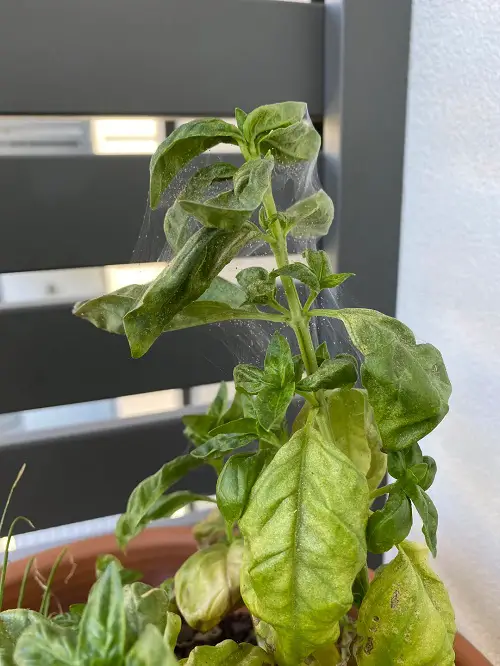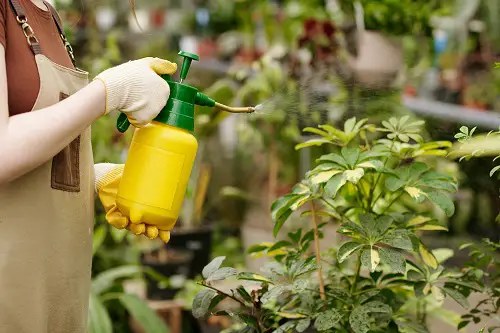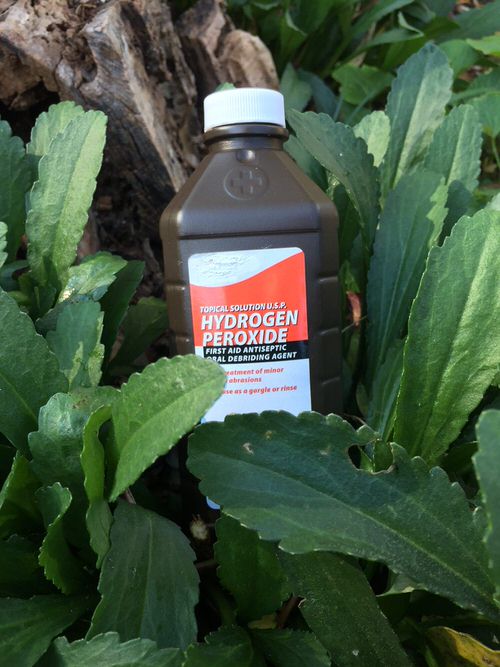Does Hydrogen Peroxide Kill Spider Mites? If you are confused and don’t have any idea on it, then keep reading!
Spider mites can damage plants, especially if not spotted at the right time. If you are someone who doesn’t want to buy expensive pestisides and looking for a cheaper option, then this article is for you!
Spider Mites – How They Harm the Plant
Physical Characteristics
- Size: Less than 1mm in length
- Color: Varies, but commonly red, brown, or yellow
- Webbing: Often leave fine, silky webs on the underside of leaves
Common Signs
- Spots: Small, yellow, or brown spots on leaves
- Webs: Thin webs may appear on leaves or between stems
- Leaf Drop: Affected leaves may fall off
Feeding Damage
- Cell Drain: Spider mites pierce plant cells and suck out the contents, leading to cell death.
- Leaf Damage: This feeding causes stippling, yellowing, and browning of leaves, which can result in reduced photosynthesis.
- Stress: Plants under spider mite attack suffer stress, making them susceptible to diseases.
Transmission
- Virus Spread: Spider mites can transmit plant viruses, exacerbating the harm done.
- Multiple Hosts: They can infest a variety of plants, quickly spreading across your garden if not controlled.
Does Hydrogen Peroxide Kill Spider Mites?

Yes, hydrogen peroxide can help in controlling spider mites.
Oxidative Damage
- Oxidizing Agent: Hydrogen peroxide is a powerful oxidizer that can disrupt the cellular functions of spider mites.
- Cell Membrane Damage: Upon contact, hydrogen peroxide can break down the cell membranes of spider mites, causing them to desiccate and die.
Disruption of Life Cycle
- Egg Elimination: Hydrogen peroxide can also effectively kill spider mite eggs, disrupting the life cycle of the pests.
Tips for Using Hydrogen Peroxide Against Spider Mites
When it comes to using hydrogen peroxide as a natural remedy against spider mites, following the right techniques is crucial for its effectiveness.
1. Proper Dilution
Hydrogen peroxide is a powerful substance, and using it undiluted can harm your plants. Always dilute it before application. The ideal mixture involves combining one part hydrogen peroxide with ten parts water.
This dilution strikes the perfect balance, ensuring the solution is potent enough to combat spider mites while being gentle on your plants.
2. Conduct a Patch Test
Before you treat your entire plant, it’s essential to perform a patch test. Apply a small amount of the diluted hydrogen peroxide solution on a discreet area of the plant, preferably on the underside of a leaf.
Observe the treated area for at least 24 hours. If there are no adverse reactions such as wilting, browning, or unusual discoloration, it’s likely safe to proceed with treating the entire plant. This precautionary step helps you avoid unintentional damage to your precious plants.
Broccoli Spider Mites Problem: Reasons and Solutions
3. Timing and Frequency
Spider mites reproduce rapidly, so regular treatments are necessary to disrupt their life cycle. Begin the hydrogen peroxide treatment as soon as you notice spider mites or their telltale signs, such as stippling on leaves or fine webbing.
For persistent infestations, apply the solution every 3 to 5 days. Be diligent in your approach, as missing even a single treatment can allow the mite population to rebound.
4. Complete Application
Ensure thorough coverage of the affected plant. Spider mites tend to hide on the undersides of leaves, so pay special attention to these areas.
Use a spray bottle to apply the hydrogen peroxide solution, ensuring it reaches the nooks and crannies where the mites might be hiding. A fine misting spray helps cover a larger surface area while conserving the solution.
5. Protective Measures
While hydrogen peroxide is generally safe for plants when used as directed, it’s advisable to wear protective gloves and goggles during the application to prevent any skin or eye irritation.
Additionally, consider wearing a mask to avoid inhaling fumes, especially if you are working in an enclosed space. Adequate ventilation is crucial, so if possible, treat your plants outdoors.
By adhering to these detailed guidelines, you can harness the power of hydrogen peroxide effectively, safeguarding your plants from the menace of spider mites.
Does Hydrogen Peroxide Kill Spider Mites – FAQs
1. Is Hydrogen Peroxide Safe for All Plants?
While many plants tolerate hydrogen peroxide well, some sensitive species might be negatively affected. It’s advisable to test the solution on a small portion of the plant before widespread application.
2. Can Hydrogen Peroxide Be Used Indoors?
Yes, hydrogen peroxide can be used indoors. However, to avoid inhaling fumes, ensure proper ventilation and consider temporarily moving the treated plants outdoors.
3. Are There Natural Alternatives to Hydrogen Peroxide for Spider Mite Control?
Yes, natural alternatives like neem oil, insecticidal soaps, and predatory mites can also be effective against spider mites. Consider a combination of these methods for a more holistic approach.
While it does have its limitations, when used correctly and consistently, hydrogen peroxide can contribute significantly to reducing spider mite populations. As with any pest control method, observation, caution, and a proactive approach are essential. Armed with this knowledge, you can make informed decisions and protect your beloved plants from the clutches of troublesome spider mites.



